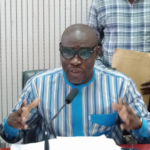By Tommy Francis Alpha, Isatu Konnah Sesay and Elizabeth Saffiatu Koroma (HED/MoH, Interns)
In a proactive move to enhance public health communication, the National Public Health Agency (NPHA) held a comprehensive one-day orientation session for social media bloggers, focusing on crucial topics including Polio SIA 3, MPOX, and drug and substance abuse reporting tools. The event, which took place on Tuesday, September 25th 2024, at the Emergency Operation Centre “EOC” aimed to empower bloggers with the essential knowledge and skills necessary to disseminate accurate and impactful health information to their audiences.
The session gathered influential bloggers from various platforms, emphasizing the significant role they play in shaping public perception and promoting health awareness in their communities. NPHA officials highlighted the importance of responsible reporting, urging participants to prioritize accuracy and fact-checking in their content creation.
Mr. Harold Thomas, a leading health expert and Risk Communication Lead in the Government of Sierra Leone, opened the session by addressing the urgency of current public health challenges. “In an age where misinformation spreads rapidly, it is imperative that we equip our digital communicators with the tools they need to share credible information and it is crucial at this time that Social Media Bloggers hold the critical position of trust, in the sense that bloggers are highly trusted by their followers,” Mr. Thomas
“We are training you to give you the opportunity to educate, to inform and to mobilize individuals and families in the fight against polio, and to also safeguard the health of the population.”
Mr. Harold Thomas enlightened the bloggers on the repercussions of the disease stating that Polio is a sickness that affects both the young and old. However, it is riskier and life threatening for children under 0-5 years. It is very dangerous due to the fact that it affects the nerves and brain stem, thus if care is not taken it leads to paralysis which is irreversible.
The orientation provided in-depth insights into the ongoing Polio SIA 3 campaign, which aims to immunize children against poliovirus, alongside critical updates on MPOX and the necessity of effective drug and substance abuse reporting.
The representative from UNICEF, Marieahmeda Wurie oriented the bloggers on Key messages about the campaign, stating that an awareness be raised on facts that: There is an outbreak of Polio in Sierra Leone; The Ministry of Health with support from its partners will engage in vaccination of children from 0-5 years from the 27th- 30th September, 2024; The vaccinators will visit every house hold, so it is important that children stay at home; The Oral Polio Vaccine is administered orally with two drops in the mouth; It is Supplementary Immunisation Activity, and it is safe to take it even after a child had been given the first and second dose of the vaccine, emphasizing that it builds up the child’s immune system against the virus; If a child is travelling vaccination should be done immediately; All vaccination of children 0-5 years are free, including Polio Marklate.
She ended her orientation by noting the hashtag for the third face Polio Vaccination Campaign, “Polio Free Salone “.
Participants engaged in interactive sessions and workshops designed to enhance their understanding of these public health issues, along with strategies for responsible storytelling.
Throughout the day, bloggers were encouraged to share their learnings with their followers and to engage in constructive dialogues around these pressing health matters.
“Our goal is to create a network of informed bloggers who can act as ambassadors for public health initiatives,” said Madam Rachael Kuyembeh, Public Relations Officer (1) for NPHA.
Mr. Michael Kamara introduced the Incident Reporting Application to the bloggers stating that the application is very essential as it aids the swift report of drug abuse and other public health emergencies in SierraLeonean.
“The application works both online and offline, thus, reports with videos and pictorial evidences can be made with or without Internet connections,” stated Mr. Michael Kamara.
Responding to questions asked, he noted that the app is secured, as the information of informants are not disclosed, the situation room which is made up of strategic pillars such as, the National Drug Law Agency, Social Welfare, the Ministry of Information and Communication, and the National Public Health Agency, response swiftly to reports made through multiple social medial channels.
He ended by stating that the application can be downloaded at play store with an android phone, by typing ” Drug Abuse in Sierra Leone “.
As the session concluded, attendees left with a renewed sense of responsibility and commitment to their roles as health communicators. Many expressed enthusiasms about the opportunity to influence public health positively and to advocate for informed decision-making among their followers.
The NPHA’s initiative underscores the critical intersection of social media and public health, recognizing that in today’s digital landscape, bloggers are not just content creators but essential partners in the fight against misinformation.
Bloggers were urged by the NPHA to use their platforms to aid in the fight against Polio by popularising the third phase Polio Vaccination Campaign, thereby saving the lives of children in Sierra Leone.



